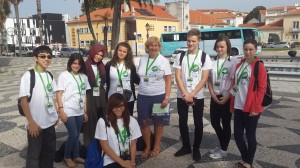 Our group was given the subject of electronic waste. We interviewed Malgorzata Luszczek, the International YRE Director international and the FEE Head Office.
Our group was given the subject of electronic waste. We interviewed Malgorzata Luszczek, the International YRE Director international and the FEE Head Office.
- How an why did you start to be concerned about environmental issues?
It was in the secondary school when I began to be concerned about environmental issues. I had a feeling that something was missing in my life…
I studied humanities classes, where I learned history, geography, polish language and literature. I was thinking that throughout these four years I was missing something. I applied to a technical university to become an environmental engineer. When I went to the university, I understood which part of my life was missing. Before, I was focused on literature and arts, and now I can see that through my profession I can work with people and make change. After graduating, I decided to work in rural areas with local municipalities. I created and involved local communities in activities to work together, and to change something in their life. I am from Poland and I was graduating from university in the 2000’s. It was just after the ommunism collapsed. If you know, communism was very hard for the people. People didn’t feel freedom. I felt responsible for the development of the Polish people and took the role of one of the leaders in my local community. I had an idea of forming a local community that did not go to the top of the municipalities, because they do not make the decisions to develop projects that the community needs, such as parks or bicycle lanes, instead of waiting for solutions from the municipalities. When I was in university I was looking for an additional job and found an advertisement for an assistant of a secretary in Polish Environmental Partnership Foundation. I developed several programs, and became a national coordinator for the Eco-schools programs at the Polish foundation as a FEE member in Poland. Even though I started working on a national level, I kept a close contact with the local communities and a variety of other programs.
- What are the strengths and weaknesses of using education to create change?
I think to create change, we must develop our knowledge, and have people who understand the situation. In many cases it can be a either a strength or a weakness, because if people are not well educated, they do not understand that we must recycle waste, you have to help them to understand that needs. Sometimes you have to highlight for example economical benefits together with the environmental, because this aspect will be easier to understand by people.
The strength is also that by educating, you can show the benefits for this kind of work. If we have knowledge, we can share it with people and this can be our strength. Environmental education is powerful, that is what I have seen from working with schools and youth. If you have enthusiasm and if you believe in what you are doing, you will take people with you.
- Is electronic waste related to any FEE programs?
Eco-schools are related to electronic waste, but FEE doesn’t focus on specific problems.
To Eco-schools on national level, for sure. Schools organize programs about electronic waste. It is relevant to YRE too, because young reporters can investigate the problem with electronic waste. In many countries there is no solution for collecting nor recycle such kind of waste. It’s crucial for young reporters to inform people that there are effective solutions for this issue.
- How does FEE tackle electronic waste?
First of all, we are not a fighting organization. [giggles] We are educating through our five global programs such as : Blue Flag in beaches, Green Key for hotels, Young Reporters for the Environment, Eco-schools and Learning about forests. We are providing service, knowledge and promoting FEE on global scale. In countries where there are problems, we help develop a better contact with municipalities and ministries, as well as turn international attention to local problems. It is complicated for FEE International to provide global solutions, because every country has different mentalities, economical situations, political preferences etc.
- Who is responsible for electronic waste?
From European Union point of view, there are a lot of European directives on how we should handle electronic waste, to not poison the environment. There are similar directives in Canada, China etc. , adjusted to their circumstances, but for example in several African countries, there are no such directives and they still have problems with garbage and normal litter, which are just thrown everywhere. People are living in those areas and are not concerned about it because of the lack of education.
- What are the problems caused by electronic waste and what do you think must be done to reduce them?
Electronic waste is mostly connected to our use of high-tech technology. I think the best solution is education because we are not the people who want to go back to Stone or Iron Age, where people did not have any high-tech solutions. We have to develop our knowledge and be responsible for not buying new electronic items, if the previous ones still work properly.
Electronic waste contains several materials, that are poisonous and hard, or even impossible to recycle. I think it is the biggest problem. As a solution, cameras, phones and other technologies are getting smaller and as a result, they contain less hazardous materials. Maybe in future we will have a hologram screen, that comes from our hand, who knows how far modern technology will get. [laughs]
Group 3: Max Erenberg, Connie Le, Mārtiņš Seleckis, Irina Gavrilova, Reyhan Helmazovorska, Veronika Moncoľová,Shahar



You must be logged in to post a comment.